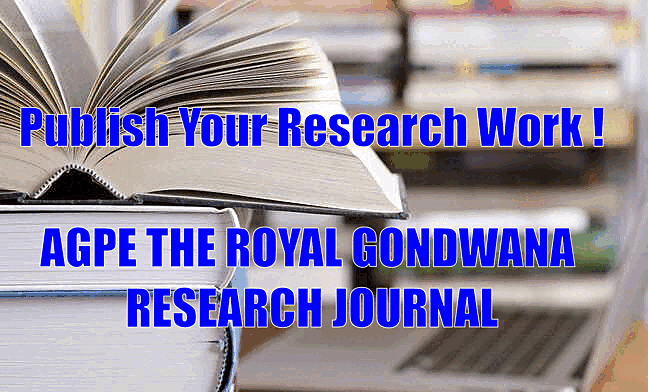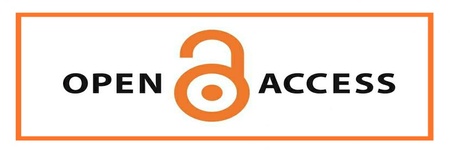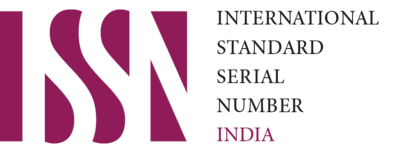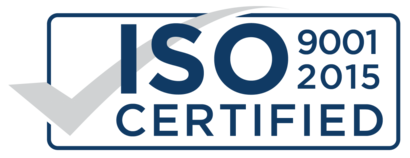About the Journal
FOCUS AND SCOPE
SECTION POLICIES
PUBLICATION FREQUENCY
PEER REVIEW POLICY
PUBLICATION ETHICS
INTERNAL POLICY
CONFLICTS OF INTEREST
OPEN ACCESS POLICY
ANTI-PLAGIARISM POLICY
WITHDRAWAL_MANUSCRIPT
JOURNAL SCIENTIFIC STATEMENT
REFERENCE MANAGEMENT SOFTWARE
ARCHIVING
FOCUS AND SCOPE
Aim & Scope: Our main aim is to provide customized services for publishing research for students and researchers from around the globe. Our aim to provide the most original, authentic and up to date research results via your respective submissions. We take care of your requirements, and ensure that your research is published in no time by the top scholars of the industry. AGPE The Royal Gondwana Research of History, Science, Economic, Political and Social Science is an open access peer review publication which is established for publishing the latest trends in Humanities, Social science, Commerce & management and Science. We give priority to quality papers which emphasis on basic and important concept through which there would be remarkable contribution to the research arena and also publish the genuine research work in the field of Humanities, Social science, Commerce & management, Science and technologies.
Disciplines Covered: All Subjects & All Disciplines
Vision: To be recognized globally as a stakeholder in the academic community and to be a contributor in expanding the frontiers of knowledge
Mission: Our mission is to contribute to the progress and application of scientific discoveries, by providing free access to research information online without financial, legal or technical barriers. Our Research Journal will be freely distributed and available from multiple websites. The journal stresses on academic excellence, research rigor, knowledge dissemination and collaborative scholarly efforts: To train for the expertise of researchers in writing, peer review and journal. To recognize the achievements of researchers, research leaders and research institutions. To disseminate, publish and utilize multidisciplinary and discipline-specific research journal. Our board aim is to provide the most original, authentic and up-to-date research results via your respective submissions. The coverage of the journal includes all new theoretical and experimental findings. AGPE The Royal Gondwana Research Journal is also committed to index all published papers in top indexing of the world.
Objectives: To publish original innovative and novel research articles. To encourage scholars to write their research ideas without worrying about Complex Process. Fast Publication and Open Access. To encourage scholars to write high quality research papers.
SECTION POLICIES
Comments and Criticism
Articles/ Review articles/ Case studies
PUBLICATION FREQUENCY
AGPE The Royal Gondwana Research Journal of History, Science, Economic, Political and Social Science(AGPE-RGRJ) is regularly published every month (Jan to Dec)(12 issues yearly) by Adivasi Gondwana Bhasha Prachar Bahuudheshiya Shikshan Sanstha Tipagad Warora.
From establishment 2019- Published annual (yearly) issues till 2021.
Annually issues - 2019-20, 2020-21, 2021-22 (Issue 1)
From 2021 changed frequency into Monthly.
Monthly issues - 2021-22 (Issue 1) onwards
PEER REVIEW POLICY
The submitted manuscript is first reviewed by an editor. It will be evaluated in the office, whether it is suitable for AGPE The Royal Gondwana Research Journal of History, Science, Economic, Political and Social Science(AGPE-RGRJ) focus and scope or has a major methodological flaw and similiarity score by using Turnitin. The manuscript will be sent to at least two anonymous reviewers (Double Blind Peer Review). Reviewers' comments are then sent to the corresponding author for necessary actions and responses. The suggested decision will be evaluated in an editorial board meeting. Afterwards, the editor will send the final decision to the corresponding author. Utilizing feedback from the peer review process, the Editor will make a final publication decision. The review process will take approximately 12-15 days. Decisions categories include:
- Reject - Rejected manuscripts will not be published and authors will not have the opportunity to resubmit a revised version of the manuscript to AGPE The Royal Gondwana Research Journal of History, Science, Economic, Political and Social Science(AGPE-RGRJ).
- Resubmit for Review– The submission needs to be re-worked, but with significant changes, may be accepted. However, It will require a second round of review.
- Accept wtih Revisions - Manuscripts receiving an accept-pending-revisions decision will be published in AGPE-RGRJ under the condition that minor/major modifications are made. Revisions will be reviewed by an editor to ensure necessary updates are made prior to publication.
- Accept - Accepted manuscripts will be published in the current form with no further modifications required.
PUBLICATION ETHICS
AGPE the Royal Gondwana Research Journal of History, Science, Economic, Political and Social Science (AGPE-RGRJ) is a scientific journal published by Adivasi Gondwana Bhasha Prachar Bahuudheshiya Shikshan Sanstha Tipagad Warora (AGPE Charitable Trust). The Editorial Board is responsible for, among others, preventing publication malpractice. Unethical behavior is unacceptable, and the AGPE the Royal Gondwana Research Journal of History, Science, Economic, Political and Social Science (AGPE-RGRJ) does not tolerate plagiarism in any form. Authors who submitted articles: affirm that manuscript contents are original. Furthermore, the authors’ submission also implies that the manuscript has not been published previously in any language, either wholly or partly, and is not currently submitted for publication elsewhere. Editors, authors, and reviewers, within the AGPE the Royal Gondwana Research Journal of History, Science, Economic, Political and Social Science (AGPE-RGRJ), are to be fully committed to good publication practice and accept the responsibility for fulfilling the following duties and responsibilities, as set by the COPE Code of Conduct for Journal Editors. As part of the Core Practices, COPE has written guidelines on the http://publicationethics.org/resources/guidelines.
Section A: Publication and authorship
• All submitted papers are subject to a strict peer-review process by reviewers that are experts in the area of the particular manuscript.
• The review process is double-blind peer-review.
• The factors that are taken into account in the review are relevance, soundness, significance, originality, readability, and language.
• The possible decisions include acceptance, acceptance with revisions, or rejection.
• If authors are encouraged to revise and resubmit a submission, there is no guarantee that the revised submission will be accepted.
• Rejected articles will not be re-reviewed.
• The paper acceptance is constrained by such legal requirements as shall then be in force regarding libel, copyright infringement, and plagiarism.
• No research can be included in more than one publication.
Section B: Authors’ responsibilities
• Authors must certify that their manuscripts are their original work.
• Authors must certify that the manuscript has not previously been published elsewhere.
• Authors must certify that the manuscript is not currently being considered for publication elsewhere.
• The authors must participate in the peer-review process.
• Authors are obliged to provide retractions or corrections of mistakes.
• All Authors mentioned in the paper must have significantly contributed to the research.
• The authors must state that all data in the paper are real and authentic.
• The authors must notify the Editors of any conflicts of interest.
• The authors must identify all sources used in the creation of their manuscripts.
• Authors must report any errors they discover in their published papers to the Editors.
Section C: Reviewers’ responsibilities
• Reviewers should keep all information regarding papers confidential and treat them as privileged information.
• Reviews should be conducted objectively, with no personal criticism of the author.
• Reviewers should express their views clearly with supporting arguments.
• Reviewers should identify relevant published work that has not been cited by the authors.
• Reviewers should also call to the Editor in Chief’s attention any substantial similarity or overlap between the manuscript under consideration and any other published paper of which they have personal knowledge.
• Reviewers should not review manuscripts in which they have conflicts of interest resulting from competitive, collaborative, or other relationships or connections with any of the authors, companies, or institutions connected to the papers.
Section D: Editors’ responsibilities
• Editors have complete responsibility and authority to reject/accept an article.
• Editors are responsible for the contents and overall quality of the publication.
• Editors should always consider the needs of the authors and the readers when attempting to improve the publication.
• Editors should guarantee the quality of the papers and the integrity of the academic record.
• Editors should publish errata pages or make corrections when needed.
• Editors should have a clear picture of research funding sources.
• Editors should base their decisions solely on the papers’ importance, originality, clarity, and relevance to the publication’s scope.
• Editors should not reverse their decisions nor overturn the ones of previous editors without serious reason.
• Editors should preserve the anonymity of reviewers.
• Editors should ensure that all research material they publish conforms to internationally accepted ethical guidelines.
• Editors should only accept a paper when reasonably certain.
• Editors should act if they suspect misconduct, whether a paper is published or unpublished, and make all reasonable attempts to persist in obtaining a resolution to the problem.
• Editors should not reject papers based on suspicions; they should have proof of misconduct.
• Editors should not allow any conflicts of interest between staff, authors, reviewers, and board members
Section E: Publisher's responsibilities
• The publisher only publishes articles which are suitable to the theme of Journal, which mainly about Environmental Health. The submitted manuscript which is not suitable with the theme would be returned to the author.
• The publisher only publishes articles which have passed the review and revision process until the articles eligible and acceptable for publication. Manuscript articles which are still not suitable / unable to fulfill the requirements after the revision process would not be published and would be returned to the author.
• The publisher reserves the right to revoke articles of circular publications (electronic and print version) if later proven that the article has a conflict of interest as well as the result of plagiarism.
• Disputes arising in respect of copyright and originality of the script/plagiarism would be returned to the author as the party who submitted the works and would not be the responsibility of the publisher.
INTERNAL POLICY
Editors, Peer-reviewers, and Proofreaders from AGPE-RGRJ are permitted to submit articles in this journal with the following conditions:
- The Editor and Peer-reviewers of AGPE-RGRJ who submit articles to this journal will be released temporarily from the editorial process (especially in their manuscripts) starting from when they submit the article. This policy is included in the decision to publish articles (accepted without revisions, accepted with minor revisions, accepted with major revisions, or rejected) at least 1 issue/number.
- The Editor and Peer-reviewers of AGPE-RGRJ who submit articles are not permitted to interfere in the editorial process of the edition/number when the article is sent to AGPE-RGRJ.
- Every editorial process will be carried out by another Editor, Peer-reviewer so that the process continues without problems.
- There is no special treatment for the Editor and Peer-reviewers of AGPE-RGRJ who submit articles to AGPE-RGRJ.
CONFLICTS OF INTEREST
The journal requires that all authors disclose any potential sources of conflict of interest.
“The potential for conflict of interest and bias exists when professional judgment concerning a primary interest (such as patients' welfare or the validity of research) may be influenced by a secondary interest (such as financial gain). Perceptions of conflict of interest are as important as actual conflicts of interest.”
Any interest or relationship, financial or otherwise that might be perceived as influencing an author's objectivity is considered a potential source of conflict of interest. These must be disclosed when directly relevant or directly related to the work that the authors describe in their manuscript. Potential sources of conflict of interest include, but are not limited to the following: patent or stock ownership, membership of a company board of directors, membership of an advisory board or committee for a company. If the authors have no conflict of interest to declare, they must also state this at submission. It is the responsibility of the corresponding author to review this policy with all authors and collectively to disclose with the submission.
OPEN ACCESS POLICY
AGPE The Royal Gondwana Research Journal of History, Science, Economic, Political and Social Science (AGPE-RGRJ) provides immediate open access to its content on the principle that making research freely available to the public supports a greater global exchange of knowledge. All the manuscripts published, after peer review by AGPE-RGRJ, are freely available to readers. These accepted manuscripts are available for public viewing without any restriction or registration. The copyright of publishing remains with authors and they are free to redistribute manuscript without any restriction. The readers can freely access these manuscript and frame their research or academic work.
ANTI-PLAGIARISM POLICY
AGPE The Royal Gondwana Research Journal is strictly against any unethical act of copying or plagiarism in any form.All incoming manuscripts will be authenticated to prevent plagiarism by using Turnitin or anti-plagiarism software.
Before going to review process, all manuscripts will be checked that they are free from plagiarism practice (less than 20% similarities). If there an indication of plagiarism (higher than 20% similarities), the manuscript will instantly be rejected.Policy and Action for Plagiarism:
A) Plagiarism before Publishing
AGPE The Royal Gondwana Research Journal tries to find out the case of plagiarism on its own level. If plagiarism is detected by the editorial board member, reviewer, editor etc., in any stage of article process- before or after acceptance, during editing or at a page proof stage. We will alert the same to the author(s) and will ask them to rewrite the content or to cite the references from where the content has been taken. If more than 20% of the paper is plagiarized- the article may be rejected and the same is notified to the author..
B)What If Plagiarism Detected After Publication
If plagiarism is detected after publication, the Journals will conduct an investigation. If plagiarism is found, the competent authority of the AGPE The Royal Gondwana Research Journal will contact the author's institute and funding agencies. The paper containing the plagiarism will be marked on each page of the PDF. Depending on the extent of the plagiarism, the paper may also be formally retracted. Once we find papers associated with any plagiarism/misconduct, we will:
1. Reject the submitted manuscript or withdraw the published paper.
2. Not accept manuscripts submitted to all AGPE-RGRJ journals by the same research team within one year.
3. Inform the institution the corresponding author is affiliated with and the funder(s) about such misconduct.
4. Once the manuscript is found to have committed publication misconduct, we will immediately withdraw the published paper and as misconduct by author/authors any article processing charge has not refund in any condition.
5. As a penalty of misconduct publication/ Duplicate publication charge $ 500 (foreign authors) or Rs. 5000 (Indian authors) as compensation costs in case that a published paper is withdrawn.
WITHDRAWAL MANUSCRIPT
The author is not allowed to withdraw submitted manuscripts, because the withdrawal is a waste of valuable resources that editors and referees spent a great deal of time processing submitted manuscript, and works invested by the publisher.
If the author still requests withdrawal of his/her manuscript when the manuscript is still in the peer-reviewing process, the author will be punished with paying $15 USD per manuscript, as a withdrawal penalty to the publisher. However, it is unethical to withdraw a submitted manuscript from one journal if accepted by another journal.
The withdrawal of the manuscript after the manuscript is accepted for publication, the author will be punished by paying $15 USD per manuscript. Withdrawal of the manuscript is only allowed after the withdrawal penalty has been fully paid to the Publisher. If the author doesn't agree to pay the penalty, the author and his/her affiliation will be blacklisted for publication in this journal. Even, his/her previously published articles will be removed from our online system.
If any request: agpe.researchjournal[at]gmail.com
JOURNAL SCIENTIFIC STATEMENT
Articles published in AGPE-RGRJ Journal are proven scientifically following the ethical code of scientific publications. The code of ethics itself upholds three ethical values in publications, namely, (1) Neutrality (free from conflicts of interest in managing publications); (2) Justice (giving authorship rights to the recipient as a writer); and (3) Honesty (free from duplication, forgery, forgery, and plagiarism) in publications. Published articles also follow certain procedures or orders, such as double-blind reviews and revision processes that are consistent with regular journal reviews, to ensure that the quality is well maintained.
REFERENCE MANAGEMENT SOFTWARE
All articles sent to AGPE-RGRJ must use reference management software (e.g., Mendeley, EndNote, and Zotero) with APA style quote, 6th Ed.
ARCHIVING
AGPE-RGRJ is stored in a digital archive to ensure long-term digital preservation. These archives include:
LOCKSS and CLOCKSS








